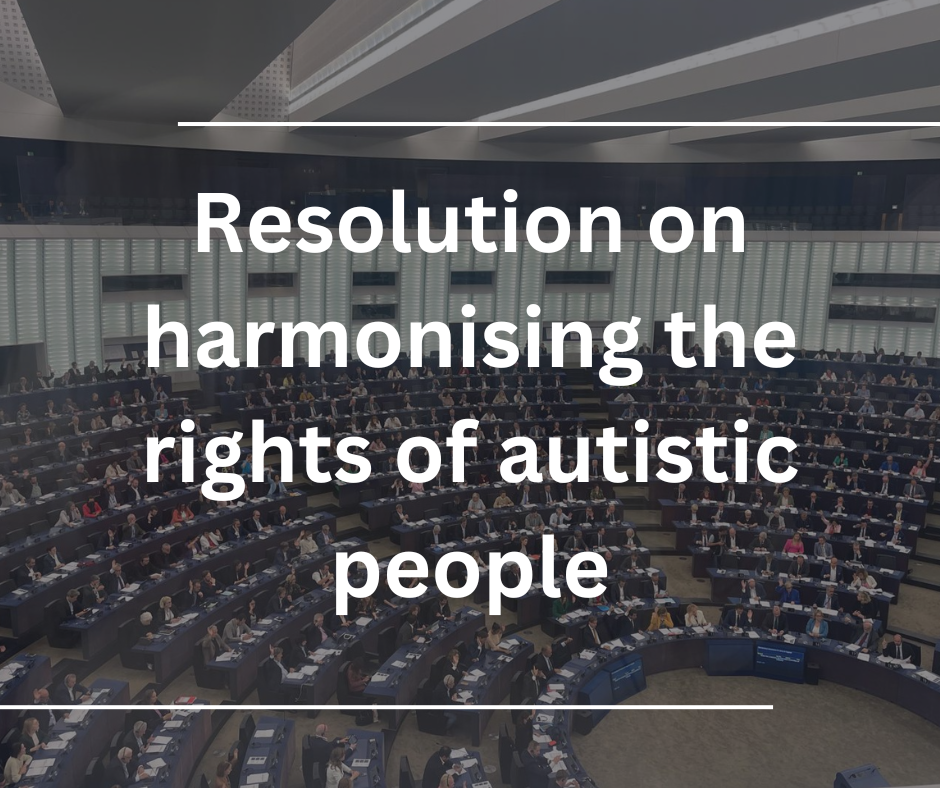
On Wednesday, 4 October 2023, the European Parliament (EP) adopted a non-binding resolution entitled “Harmonising rights of autistic people”. AE welcomes the adoption of this resolution, which calls on the European Commission and European Union (EU) Member States to take into account the rights and needs of autistic people. The Resolution spans key areas from access to diagnosis, to eligibility for the upcoming European Disability Card (and more generally disability status), highlighting various areas of discrimination across the lifespan without omitting the specific needs of girls and women on the autism spectrum and other groups. The resolution came about after AE’s Spanish member Autismo España’s appearance before the European Parliament Committee on Petitions in February 2023 and is based on in-depth input from Autism-Europe regarding the needs of the autistic community.
The non-binding resolution highlights the many challenges faced by autistic people (as well as their families), during their lifetime and thus calls for action in various domains to address their needs. The European Parliament emphasizes that progress should be made across sectors, including access to diagnosis, healthcare, education, employment, accessibility and provision of reasonable accommodation, legal capacity, lifelong support in the community and deinstitutionalisation, culture and sport, training of professionals across sectors, research, fight against violence and forced sterilisation.
The resolution recalls that autism is a spectrum and that support needs differ vastly, which calls for person-centred interventions and support. The resolution notes there are still unproven practices and potentially harmful therapies and interventions, “including clearly illegal procedures involving the serious physical abuse of children, such as bleach enemas, which are still widespread and under-regulated in most Member States” of the European Union (recital C).
In the resolution, the European Parliament raises the concern that autistic people might not always be eligible for the upcoming European Disability Card scheme. This is linked to the fact that many autistic people across the EU struggle to have their disability status recognised. In this regard, the resolution directly echoes the petition by Autism-Europe’s Spanish member Autismo España presented in February 2023 on the matter. The resolution adopted today highlights that “the lack of mutual recognition of disability status and of the autism diagnosis between Member States creates barriers for autistic persons and their families to fully exercising their right to freedom of movement within the EU” (recital M) and therefore calls for an ambitious implementation of the EU Disability Card by Member States. It also calls for “the adoption of a European legal status for persons with disabilities, allowing for mutual recognition and accreditation in all Member States” (paragraph 7).
Moreover, the resolution highlights that the proposed anti-discrimination directive on equal treatment between persons irrespective of religion or belief, disability, age or sexual orientation remains blocked by the EU Member states and should be given “priority […] at the highest political level” (paragraph 2).
Furthermore, it stresses that the new AccessibleEU resource centre should be entrusted with paying attention to autism-specific accessibility. The resolution recalls the right to inclusive education for autistic people and calls for individualised ongoing support, assistance, and better access to vocational education and training.
The European Parliament in its resolution calls for inclusive employment for people on the autism spectrum and in line with the Employment Equality Directive “to ensure positive action recruitment programmes and quotas lead to tangible employment opportunities” (paragraph 13).
It also stresses that it is vital that sufficient funds are dedicated to girls and women on the autism spectrum, “who face particularly high levels of poverty, social exclusion and violence, and of making forced sterilisation punishable as a criminal offence on the basis of the crime of sexual exploitation of women and children” (paragraph 19).
Finally, as paying close attention to intersectionality is essential to fight against discrimination of autistic people, the European Parliament “urges the Member States to actively address other forms of intersectional discrimination experienced by autistic persons, particularly those belonging to vulnerable groups” (paragraph 20).
The demands voiced by the European Parliament in this resolution echo the long-standing advocacy demands of Autism-Europe, which will make sure to follow-up on these requests.
Why the resolution today?
The specific rights and needs of autistic people were already high on the agenda of the European Parliament in this legislative term. In June 2021, the European Parliament debated with European Commissioner for Equality, Helena Dalli from Malta, the access to inclusive employment for autistic people in the EU. Autism-Europe took part in an in-depth consultation process prior to the debate by the European Parliament Committee on Employment and Social Affairs. On this occasion, Commissioner Dalli also highlighted the fruitful cooperation Autism-Europe has with her.
Recently the European Commission has proposed the European Disability Card. In the run up to this proposal, Spanish AE’s member Autismo España presented a petition to extend the eligibility criteria for the European Disability Card to all autistic people. During the drafting of the resolution that resulted from the petition, Autism-Europe extensively liaised with key Members of European Parliament to highlight the demands of the autistic community.